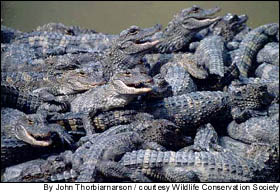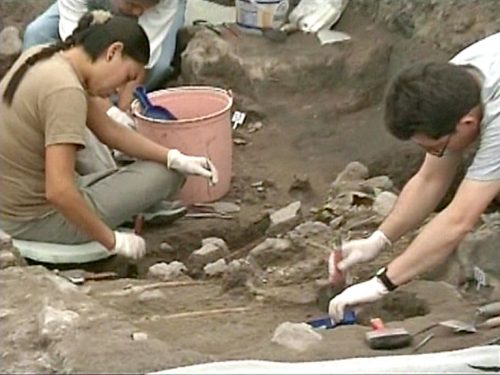
Only about 130 Chinese alligators, known as “earth dragons,” still live in the wild.
This is the Year of the Dragon, and wildlife conservationists are using this to focus attention on the plight of the Chinese alligator. Known in China as Tu Long — the earth dragon — the Chinese alligator is the most endangered of the 23 species in the crocodile family.
“The real critical issue for the Chinese alligator is that there is no habitat left,” says John Thorbjarnarson, conservation zoologist for the Wildlife Conservation Society (WCS). “The species is teetering on the brink of extinction in the wild.
“But this is not a problem where we should just throw up our hands. With a little bit of attention to habitat conservation, it would be an easy problem to fix.”
RICE FARMING CHEWS UP HABITAT
Chinese alligators have been around for about 20 million years, living in the marshes and ponds of the lower Yangtze River valley. This area of southeastern China has one of the the longest traditions of agricultural use in the world, says Thorbjarnarson. Rice was cultivated there 7,000 years ago.
Today the area is densely populated, and nearly all of the wetlands that provided habitat for the earth dragon have been converted to agriculture. The Chinese alligator populations that remain are confined to a few ponds and marshes in the Anhui province.
China designated the alligator as a Class I endangered species in 1972, but protection was enforced haphazardly and the government plan emphasized captive-breeding programs over habitat protection. In the mid-1980s, the National Chinese Alligator Reserve was created, designating 13 sites in a five-county region as protected areas.
“The 13 sites are essentially ponds belonging to local farming communities,” says Thorbjarnarson. “They’re tiny, with no vegetation, and are used as wallows for water buffalo and for crop irrigation and raising ducks. The alligators are viewed as pests. They build extensive burrows that can ruin irrigation schemes, and the adults will eat the ducks.
“There is no future for the alligators at any of these sites.”
This wetland, next to the village of Hong Xin, is one of 13 sites designated as protected and is home to 10 Chinese alligators.
On a series of visits in 1997 and 1998, Thorbjarnarson and colleagues from the Anhui Forestry Department and the East China Normal University in Shanghai found that only two of the remaining 13 sites for Chinese alligators showed any signs of reproductive activity. The largest population at any of the sites was 10 alligators.
The scientists estimate that there are only about 130 Chinese alligators still living in the wild. In less than 20 years, the Chinese alligator population in the wild will be gone, they predict.
“I would say they’re close to functionally extinct in the wild already,” says Thorbjarnarson. “The eggs found in these nests are collected for captive breeding, and the young couldn’t survive even if they weren’t.”
TYING CONSERVATION TO WETLANDS PROTECTION
The future of Chinese alligators in the wild depends on a two-part process: identifying and rehabilitating habitat for the Chinese alligator, and then populating the areas with alligators raised in captivity.
There are plenty of alligators available for a reintroduction effort. The Anhui Research Center for Chinese Alligator Reproduction, established in 1979, has more than 5,000 Chinese alligators in captivity.
As for habitat, the Chinese government, in conjunction with the United Nations Environment Program, is developing a wetlands conservation program. “Much of our effort will be focused on incorporating Chinese alligator protection into the wetlands conservation programs being developed,” says Thorbjarnarson.
“By tying alligator protection to wetlands protection, the Chinese alligator could easily turn into a conservation success story,” he adds.
With a little luck and some hard work, the Year of the Dragon might confer its blessing on the ancient earth dragon.






